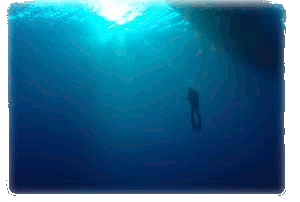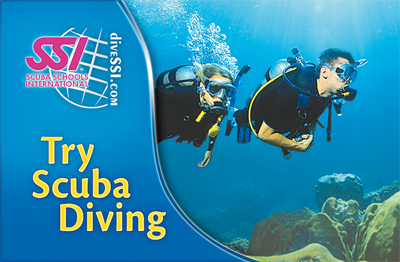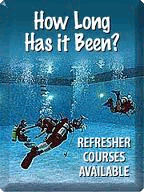
|
Advanced Adventurer
SSI’s Advanced Adventurer program was created so that you can try out a variety of specialties before you
commit to completing a full program. It’s a great way to experience what advanced training is all about and
how valuable it can be to your diving adventures.
During the Advanced Adventurer Program, you will have the chance to try out 5 different specialties. You will
complete one open water training dive per specialty, and if you decide to take a full program in any of the
specialties you tried, the dive you took can be applied to your advanced certification.

|

|
Advanced Open Water Class
Prerequisite: Basic Open Water Certification or better, from any known agency
This is a very popular class that many students take after their Basic Open Water class. Typically, this class
includes a night of lectures, and four specialty classes - Boat, Navigation,
Deep, and Night(Limited Visibility).
SSI's Advanced Diver rating stands alone in the industry with the highest combination of diving knowledge and
experience. No other agency's advanced diver level compares. An SSI Advanced Diver rating requires 4 specialties
with two dives performed in each of those specialties.

|

|
Navigation Specialty
To become a safe and confident diver, it is critical to develop an understanding of navigation.
You will learn how to navigate with a compass, and how to apply natural navigation skills,
estimate distances, navigate different search patterns, find your way to marking points, and
be able to get back to the exit point.
Course Content:
- Natural Navigation
- Compass Navigation
- Combining Natural and Compass Navigation
- Special Navigation Situations
- The Sport of Navigation

|
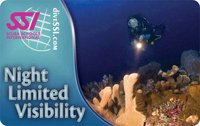
|
Night / Limited Visibility Specialty
Whether it's day or night, limited visibility can be an adventure. Just because the visibility
is limited doesn't mean the opportunities have to be. This program is filled with information
about planning and conducting night and limited visibility dives for fun, adventure, and exploration.
While diving at night you can discover a different side of this world and you can experience it from
a completely different view. It is an unbelievable feeling to discover the mysteries held underwater
when the sun goes down. With the right equipment and a powerful torch there is a lot to discover.
Night diving is a whole new way to experience the underwater world.
Course Content:
- Night vs. Limited Visibility Diving
- Special Equipment
- Preparing For The Dive
- The Dive
- Advanced Techniques

|

|
Boat Diving Specialty
Boats allow you the opportunity to explore spectacular dive sites far from shore.
This program covers the additional knowledge you need to make your first boat diving
vacation a true success, and the techniques necessary to dive properly from all sizes
and types of boats. Enhance your dive trips!
Course Content:
- Selecting Your Dive Boat
- Preparing For Your Trip
- Traveling On Your Boat
- Proper Boat Etiquette
- Diving From Your Boat
- Finishing Your Boat Trip

|
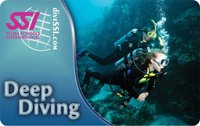
|
Deep Diving Specialty
Many of the more exciting and intriguing dive sites are located in deeper water.
Without proper training, this kind of diving can put you at risk. To plan your dives
properly, you must first know about all of the potential risks involved in DEEP
DIVING. The Deep Diving program will provide you with the knowledge, skills, and
experience required to make these types of dives safely and comfortably. Explore the big blue!
Course Content:
- Your Total Diving System & Deep Diving
- Planning Your Deep Dive
- Your Deep Dive
- Potential Hazards
- Repetitive Deep Diving

|
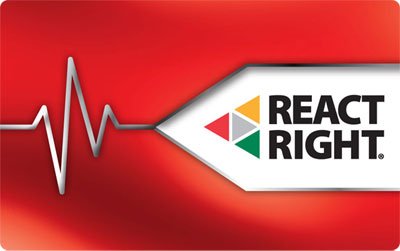

|
CPR, O2 Provider, First Aid Course
The CPR OXYGEN PROVIDER & FIRST AID course is designed to teach you adult First Aid, CPR and Oxygen
administration in two evenings. We feel every diver should know First Aid, CPR and O2 Administration,
the three most useful skills in case of a diving accident. The usual deterrent to the acquisition of
this knowledge was the time and money required to take these three classes.
High Sierra Divers course cuts to the chase, giving the student the information they need to know in
an easy to remember format. The course is a performance-based program allowing you to master these
skills and become a better dive buddy in the process.

|

|
Stress & Rescue Class
Prerequisite: A valid CPR & First Aid certificate
Diver Stress & Rescue is the next course recommended after Advanced Open Water Diver, because it helps you gain
confidence, teaches rescue methods and makes you a better dive buddy.
Knowledge: You will learn the signs of stress, and how to deal with stress in yourself and other divers
before the dive, during the dive and after the dive. Also, you will learn about different personality types and
the common actions of each type in stressful situations.
Skills: You will learn skills and techniques to help you and other divers prevent and overcome common
stressors associated with diving. You will also learn self-aid and buddy-aid skills for potentially stressful
and/or rescue situations.
Equipment: You will learn about how your equipment can help you to stay relaxed and enjoy every dive,
what equipment is required in various rescue situations and how to use your equipment properly in the event of a rescue.

|

|
Enriched Air Nitrox
Changing the mixture of gases in the air we breath has a significant effect in our bodies. Using Enriched
Air Nitrox, (EAN), has multiple benefits, but also important physical limitations that the diver needs
to be aware of.
Why dive with Nitrox? Here are four good reasons:
- Longer Bottom Times
- Shortened Surface Intervals
- Great for Repetitive Diving trips
- Reduced Exhaustion
Due to the reduced fraction of nitrogen in your breathing gas, your body will have less work and the
desaturation times will be reduced.
In your ENRICHED AIR NITROX program you will learn all the necessary rules for planning dives with Nitrox
and using Nitrox in a safe way. An important key point in the entire program is analyzing your own tank
prior to any Nitrox dive.
"Free Nitrox" is a slogan in a lot of resorts. This means that you do not have to pay a surcharge for
Nitrox, but all diving operators will want to see a valid Nitrox certificate before you can dive with it.
ENRICHED AIR NITROX contains optional dives and therefore it is a perfect "Winter Specialty" before your
diving holiday starts. This will allow you to go diving immediately and enjoy the advantages of diving with
Nitrox.

|
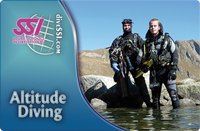
|
High Altitude Diving
Prerequisite: Basic Open Water Certification
Dive tables are designed to be used at sea level. Most of us understand that flying after
diving is dangerous. Altitude diving has similar danger due to the same reason - lower
atmospheric pressure holding the nitrogen that is dissolved in our bloodstream. Learn from
the experts who designed the only simple one-step altitude conversion tables.
In this class you will learn:
- Why you need to do conversions to dive at altitude
- Why our gauges lie to us at altitude
- How to do conversions to equivalent ocean depth
- How to use an easy one-step conversion table
- Why you need to know conversions even if you have an altitude dive computer
- Why and how long you need to wait before going home after a dive at altitude
This information is covered as part of our basic open water class and taught as a stand-alone class.
Course Contents (stand-alone class):
- One evening lecture
- Two dives at Altitude

|

|
Free Diver (Level 1)
Learn to freedive down to a maximum depth of 20m/66 feet!
This program teaches fundamental Freediving techniques for comfortable enjoyment in the aquatic world to
depths of 20m / 66ft. You will also practice Static Apnea to help develop your breath-holding abilities
and in-water comfort.
Your PFI Freediver course will cover fundamental topics such as:
- Essential Safety procedures for Breath-Holding at Freediver Level
- Proper Breathing Techniques for Freediving and Snorkeling
- Confined-Water skill development i.e. Static Apnea
- Open-Water skill development i.e. technique for Deep Diving!
- Equalization for Deep Diving
- Equipment for Freediving and Snorkeling
- The fundamental Physics & Physiology of Freediving—what happens to your body at depths!
Prerequisites:
- Swimming or snorkeling experience
- Good health and fitness – see PFI Medical Form
- At least 12 years of age with guardian permission
Typical Course runs for two weekends, and consists of lecture, pool, and open water sessions

|
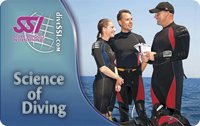
|
Science of Diving
The SCIENCE OF DIVING class covers all areas of dive theory in a comprehensive and detailed manner:
- Physics
- Physiology
- Decompression Theory
- Marine Life
- Diving Equipment
Diving is just more fun and safer if you know more about it. Whether you simply want more knowledge or plan to become a Dive Professional,
Science of Diving is the class for you!

|
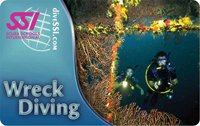
|
Wreck Diving
It is an unbelievable experience to see a big ship from a bird's perspective and to glide towards the captain's bridge. But there are also tragedies related to wrecks.
Diving on wrecks is exciting and there are some potential risks too, but with the right training, Wreck Diving will become a safer and more rewarding adventure.
During the Wreck Diving course, you will learn where and how to get background information on wrecks, how to locate wrecks and how to prepare
for a wreck dive. During the 2 mandatory dives you will apply the correct wreck diving techniques, as well as evaluate and avoid the potential risks while diving on wrecks.
Course Content:
- Selecting a Wreck
- Wreck Diving Equipment
- Locating the Wreck
- Diving the Wreck
- Advanced Wreck Diving
If you want to learn more about Wreck Diving, you can buy the manual or the DVD even if you don't want to sign up for the course.
|
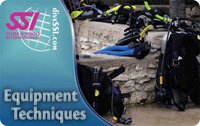
|
Equipment Techniques
Diving is more fun and more comfortable in your own equipment.
The Equipment Techniques program teaches you how to choose the right equipment for your needs.
You will learn how to fit, adjust , maintain and make small repairs right on the spot.
Course Content:
- Your Total Diving System: The Basics
- Your Total Diving System: Scuba Equipment
- Your Total Diving System: Specialty Training and Accessory System
- Traveling With Your Total Diving System
If you want to know more about Equipment Techniques, you can buy the manual or the DVD even without signing up for the course.
Combine other specialties while taking the Equipment Techniques course! Drysuit Diving or Perfect Buoyancy are great add ons. The possibilities are limitless!

|

